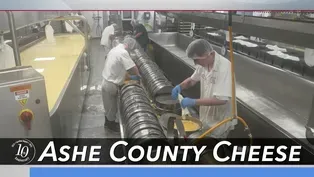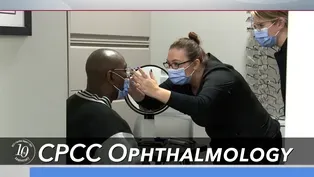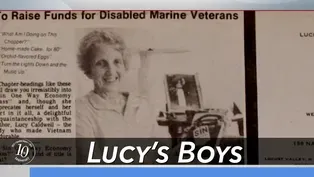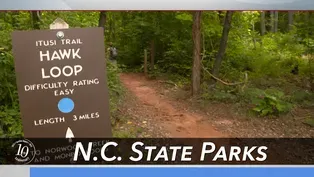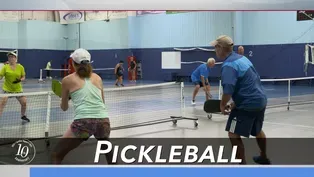
Carolina Impact: November 8, 2022
Season 10 Episode 8 | 28m 23sVideo has Closed Captions
Lucy's Boys, CPCC Ophthalmic program, Ashe County Cheese, Pickleball, NC State Parks
Lucy's Boys, CPCC Ophthalmic program, Ashe County Cheese, Pickleball, NC State Parks
Problems with Closed Captions? Closed Captioning Feedback
Problems with Closed Captions? Closed Captioning Feedback
Carolina Impact is a local public television program presented by PBS Charlotte

Carolina Impact: November 8, 2022
Season 10 Episode 8 | 28m 23sVideo has Closed Captions
Lucy's Boys, CPCC Ophthalmic program, Ashe County Cheese, Pickleball, NC State Parks
Problems with Closed Captions? Closed Captioning Feedback
How to Watch Carolina Impact
Carolina Impact is available to stream on pbs.org and the free PBS App, available on iPhone, Apple TV, Android TV, Android smartphones, Amazon Fire TV, Amazon Fire Tablet, Roku, Samsung Smart TV, and Vizio.
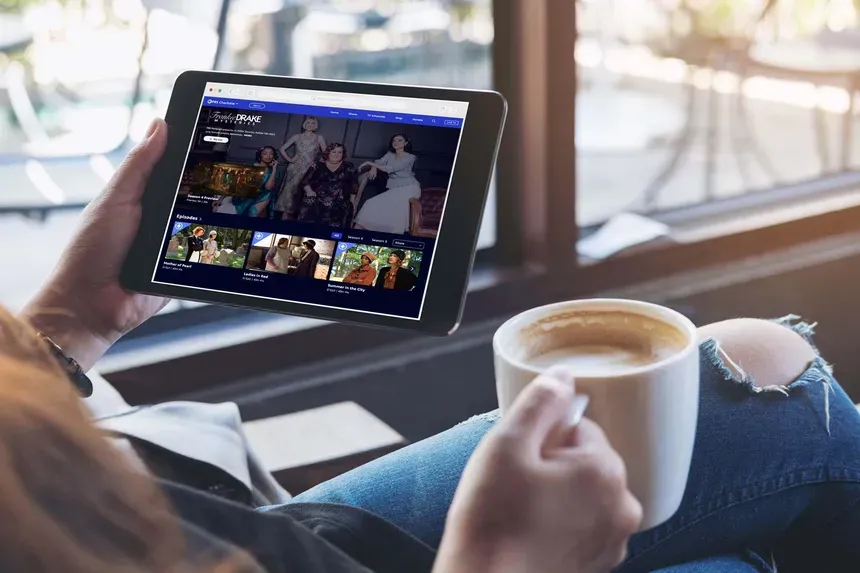
Introducing PBS Charlotte Passport
Now you can stream more of your favorite PBS shows including Masterpiece, NOVA, Nature, Great British Baking Show and many more — online and in the PBS Video app.Providing Support for PBS.org
Learn Moreabout PBS online sponsorship- [Narrator] This is a production of PBS Charlotte.
- Just ahead on Carolina Impact.
- [Jeff] In honor of Veterans Day, a story about fighting and writing in Vietnam.
And about the volunteer who made sure that the Marine's mail got home, even if they didn't.
- Plus, we'll take you inside Central Piedmont's free eye clinic.
And, learn about the fastest growing sport in the US.
Carolina Impact starts, right now.
- [Narrator] Carolina Impact, covering the issues, people and places that impact you.
This is Carolina Impact.
(upbeat music) - Good evening, thanks so much for joining us, I'm Amy Burkett.
This week we celebrate Veterans Day.
Honoring those who served in the armed forces and their families who sacrificed during that service.
Tonight we have a story about the difference one person can make.
One woman, during the Vietnam War, who helped hundreds of Marines overseas reconnect with their families back home, when they needed each other the most.
It's a story you'll only see on PBS Charlotte.
Carolina Impact's, Jeff Sonier and videographer, Doug Stacker, are at Charlottes Vietnam Memorial, with more on Lucy's Boys.
- Yeah, this is a story about all these names etched in stone and etched in the memories of friends and families.
All these lost loved ones who served and died in Vietnam, as well as the wounded who served and survived Vietnam.
Mothers and fathers, brothers and sisters, husbands and wives, all suffering and separated because of the fighting in Vietnam.
- [Soldier] Get some machine guns up here!
- Our team got hit and I got wounded.
- [Jeff] But still writing from Vietnam.
- [Tara] They were all over us before we knew what was happening.
- [Jeff] Many letters asking for prayers.
Some simply, saying goodbye.
- [Soldier] Roll up, roll up boy, get up here!
- Please don't worry about me.
I love you, Clebe.
You know, let's tell your wife.
Let's tell your wife what happened.
- [Jeff] Tara Reeves wasn't even born yet when her dad sent his letter from a Vietnam battlefield hospital.
Not knowing then, if he'd ever see his family again.
- A young man from Georgetown, South Carolina.
He's a very much decorated Marine, Lieutenant Clebe Mcclary.
- [Jeff] But in 1969, Clebe Mcclary made it back from Vietnam.
With half an arm.
A missing eye.
And a story to tell.
- You have never lived, until you nearly died.
Maybe that doesn't mean a great deal to you.
It didn't to me until I nearly died.
About 10 or 12 of the enemy, what we call a, SAFA Unit, probably better known to you as a suicide squad, started running up the hill.
These men had grenades tied around their waist.
As I got near, another grenade came in.
And again I threw my hand up, it exploded, it blew my left eye out.
Couple other grenades came in and took the legs out from under me.
As I was going through the air, all I could think of was, man, where is my shotgun?
As I reached back for it, I realized.
I reached back for my shotgun, I realized the blast had blown my left arm off.
- [Jeff] It's the story Mcclary still tells today, as a retired Marine.
Now in his 80s, with his wife Deanna at his side.
- Oh, I begged him not to go to Vietnam.
I pleaded with him.
But there's a Marine car in front of your house and this is happening every day, in the same scene that we all know, that when the car's there, it usually means they're dead.
- [Jeff] And their story of that night, on that hill in Vietnam, well, it's still just as vivid now as it was more than 50 years ago.
- It really is.
And they have a hard time because it brings back memories you're trying to put outta your head.
And I go blank on that hill quite a bit.
I lay there, it seemed like hours.
I never wanted to live so bad in my life.
If I could only see my men get off that hill alive.
If I could see my wife one more time.
(crowd applauds) - When he stood up there, they all stood.
When he finished speaking, they all stood.
- But I was scared to death.
Man, I was petrified.
Even in the hospital, I really didn't know how she was gonna react.
- She said, well, he's alive.
I went, what?
He's alive?
- [Jeff] The letter that came a few days later, dictated by her husband in his hospital bed, gave Deanna hope and so did the letter writer.
- Lucy Caldwell, USO.
And I thought, who is Lucy Caldwell?
To be in there with this bloody body and sitting there, letting me know he's alive, I always wondered.
- [Tara] I've written this letter exactly as your husband has asked me to.
- [Jeff] And years later, rereading that same letter, their daughter Tara wondered too.
- Lucy Caldwell, USO.
I started Googling Lucy Caldwell.
I thought, you know, I'm just gonna explore who this woman is.
(church bells ringing) (upbeat music) - [Narrator] Well loved and well remembered by all alumni.
- [Jeff] That search brings us to football Saturdays, here at Princeton University.
- [Narrator] Here the Tiger fans cheer the first touchdown in the victory over Yale.
- [Jeff] Where Lucy Caldwell was the wife and widow of longtime Hall of Fame Princeton coach, Charlie Caldwell.
But at age 56 and now alone, Caldwell left her home in Princeton for Vietnam, as a volunteer.
Spending three years at the USO in China Beach.
The Princeton papers are filled with stories about Caldwell, known in denying as, Lucy Baby.
Collecting donations from friends back home, for all those weary Marines in the middle of a war zone.
But in Vietnam's Battlefield Hospital wards, Caldwell was best known for spending countless hours comforting the wounded.
And writing hundreds of letters for those injured Marines, known as, Lucy's Boys.
Including a young Lieutenant from South Carolina, named, Clebe McClary.
- And in this field hospital, he could not see.
So he never saw Lucy.
But, in this hospital, when he did regain consciousness, this precious woman, he remembers her sweet voice and probably the click of her heels, she sat beside his bed and befriended him.
She got daddy to talk about his patrol and what, I mean, that's a real gift.
You know, I can only imagine her sitting next to his bed, just kinda coaxing it out of him.
And what a tremendous role that was.
- But I didn't know any of that till, well really, just recently, who she was.
But I remember her being there.
And then she wrote some other letters too, I think.
- [Jeff] In fact, Lucy wrote a book about all those letters, for all those injured Marines.
Letters that often prepared their loved ones for those injuries too.
- He was there in the bed and he said, honey, it's me.
It's me.
I know I'm not too pretty to look at but I thank God I'm alive to be with you right now.
- [Jeff] And for those Marines who didn't make it home from the hospital, well, many of those Lucy letters were also their last letters.
- Lucy was a mother too.
And I think, putting her heart in that mother's heart.
Or that wife's heart.
You know, this is what I would wanna hear.
But I think Lucy recognized the value in a handwritten note.
These are treasures.
- By the way, the title of Lucy Caldwell's book is, "Sin, One Way, Economy Class".
Which, refers to her plane ticket to Singapore, on the flight that eventually landed Lucy Caldwell in Vietnam.
It's a flight that countless Marines and Marine families are glad that Lucy made because of the difference that Lucy made in their lives, while she was there.
Amy.
- Thanks so much Jeff.
The surviving Lucy's Boys from Vietnam, including Clebe McClary, are planning a reunion soon, to celebrate Lucy Caldwell.
Organizers are also hoping to start a public letter writing campaign, in her honor.
Sending personal handwritten messages to US service members, stationed overseas.
Well, the housing market is losing steam.
Interest rates continue to rise.
The stock market remains volatile.
And inflation continues to be a major issue.
It may all sound like doom and gloom but here's a bit of good news.
The job market remains strong.
According to the US Department of Labor, more than a quarter million jobs were added in the month of September.
And the unemployment rate edged back down, to a more than 50 year low, at 3.5%.
Carolina Impact's, Jason Terzisshows us one career where the demand for qualified applicants is expected to continue to rise.
- Okay, keep looking straight at my eyes.
Tell me what numbers you see.
- [Jason] It's your typical routine eye exam.
- One.
- Except in this case, both the patient and doctor, are actually students.
- Okay, good job.
Switch over to the other side.
- [Jason] Students going through real life scenarios, of what they hope to someday be doing in the workforce.
- So look straight at my light.
- [Jason] It's all part of Central Piedmont Community College's, Ophthalmic Medical Personnel Program.
The one year diploma or two year associates degree program, prepares students for a career in eyecare.
- Within the program, we are working with students to develop skills to assist ophthalmologists.
- [Jason] And that could mean anything from history taking and educating the patient, to doing the actual vision test and assisting the physician in various procedures.
- Our program is not very well known.
Not a lot of people know about an ophthalmic career.
A lot of people think that the assistants are nurses.
So they think to go to a nursing path, would get you any type of medical profession.
But we are very specialized.
- Hi, I'm Madison, I'm gonna be taking care of you today.
We're just gonna be testing your vision.
- [Jason] First year student, Madison Merk, goes through the various steps of what she hopes to soon be doing in the real world.
- I never thought I'd be so interested in eyes.
And, like, learning different parts of the eyes and stuff like that.
Like, you wouldn't think like, that's something that you'd be super interested in, until you're in the seat.
Now, I just want you to tell me what fingers you see, okay.
- [Jason] For Madison, taking classes at Central Piedmont, is bringing her full circle.
She started her undergraduate courses at CP several years ago, before moving on to East Carolina University.
- I graduated in 2019.
- [Jason] With a degree in Hospitality Management, Madison went to work in the hotel industry.
- I worked in the Sheraton Raleigh Hotel.
I was a Sales Assistant.
I basically did all the sales work.
Like, the nitty-gritty graphs and putting in points for Marriott and stuff like that, learning about the hotel business.
- [Jason] But less than a year after starting her career, the pandemic hit and like so many others, Madison found herself without a job.
- So pandemic kinda killed the industry for me.
And it was really hard for me to, kinda, pick up a job after that because like, no one was hiring during that time.
- [Jason] After working some odd jobs to help pay the bills, she came back home to Charlotte.
- My mom suggested, hey, why don't you look into CPCC again?
See what type of programs are available.
- [Jason] So, she did.
And that search led her to the Ophthalmic Medical Personnel Program.
- Alrighty, then, can you cover your right eye for me and then read the lowest line you can see.
I love talking to people.
That's like my thing.
I love interacting with others and just, you know, getting to know people and doing something that I'm like, passionate about.
I love taking care of people.
So I'm just looking at her not covered eye right now.
- Correct.
- [Jason] When she completes the program, there's a good chance Madison and her classmates will find plenty of job opportunities.
Like many careers in the healthcare world, openings for this position are growing quickly.
- As far as demand is concerned, we are a field that is understaffed and is growing significantly.
They expect anywhere from eight to 10% continued increased growth over the next 10 years.
- [Jason] New employees entering the workforce, make an average annual salary of over $36,000.
The average for all workers across the United States, is just over 50,000.
In North Carolina though, it's slightly less, at just under 48,000.
But salaries can vary widely, depending on education, certifications, additional skills and the number of years in the profession.
Some employees make over 60,000 annually.
- And, can you tell me what numbers you see?
- 12.
- [Jason] At Central Piedmont, students learn in the classroom, through hands-on experience in the lab and assisting in the college's new public eye clinic.
Lions Services, which had been offering free vision exams and glasses, to those needing financial assistance, closed its doors in March, after more than 25 years of service.
Lions Services then donated all of its equipment and supplies to Central Piedmont, which is now continuing the free program.
- These patients don't usually have access to eyecare.
In turn, that allows our students to work early, with patients.
- The patients that we see here are from all different walks of life.
This morning we had a patient who had lost his glasses in a fire and hadn't seen in five years.
Had another patient who has been homeless and a drifter for the past 15 years, who has been trying to wear over the counter readers, which aren't working for his prescription.
So, when he got his glasses today during lunch, he started to cry.
- [Jason] Helping out in the community, for those who need the care, while at the same time, training the next generation of eyecare professionals.
For Carolina Impact, I'm Jason Terzis, reporting.
- Thank you Jason.
The free eye clinic at CPCC, is currently open two days per month by appointment only.
The hope, is to eventually add more days.
So, you might be surprised to learn, last year, Americans spent $14.7 billion on cheese.
North Carolina's Ashe County Cheese started back in 1930, by the Kraft Corporation.
A lot has changed over the years.
Jason Terzis is back to explain.
(upbeat music) - [Jason] There's lots to do in the North Carolina mountains.
You can take a hike, ride a horse, find a waterfall or head to West Jefferson and visit Ashe County Cheese.
- [Josh] The factory is built 1930, by Kraft Corporation.
That time there's a lot of dairy farms in the area.
They needed a place for all the milk to go and they built a cheese factory here.
- [Jason] Kraft operated the facility until the mid 1970s.
- And then they sold it to the, then, Plant Manager.
He owned it for a few years and then sold it to an investment group.
They owned it for, you know, a couple years and then sold it to the family that currently owns it now.
So it's been in the same family since 1994.
- Co-owner, Josh Williams serves as General Manager at Ashe County Cheese.
- I'm a Ashe County native.
I grew up here.
Came to the cheese plant, cheese store, as a kid.
Never thought I'd be working here or, you know, owning it and running it.
But, it's really neat.
- [Jason] The cheese making process starts with one basic ingredient, milk, lots and lots of milk.
- Most of our milk comes to us from local dairy farms within about a 50 mile radius of the plant.
We run about 400,000 pounds of milk through the plant a week.
And make about 40,000 pounds of cheese.
It's about a 10 to one ratio.
It takes about 10 pounds of milk to make one pound of cheese.
- [Jason] Brandon Hardin, also a co-owner, oversees cheese production.
- We start the plant up around midnight.
And we're gonna prep the plant for the day coming in.
Then we will take the raw milk and we will run it through pasteurization, into the vat.
Once the milk's in the vat, we will add a lactic acid, creating bacteria, to it.
And then we will let that milk ripen with that in it.
Then we can add color, if it's a Colby or a Cheddar.
Or, not add color, if it's a Jack.
And we will agitate the lactic acid, creating bacteria that we add to it.
We add rennet it to, the milk will coagulate.
And then we cut it in cubes and that separates the solids from the liquid.
So the solids is cheese then and the the liquid is whey.
- [Jason] Workers drain off the whey, leaving behind the cheese curds.
But they aren't done yet.
- [Brandon] Well, after the whey is drained off, then we will salt the cheese.
And we have an agitator that goes up and down and mixes the salt in with the cheese.
- [Jason] The final step, packing the cheese curds into round forms and then pressing the cheese several times, to form that familiar wheel shape.
The work is labor intensive and the conditions inside the cheese making room resemble a sauna.
- Inside the facility, we try to keep it around 80 degrees and it's got a very high humidity.
But the reason for that is, when we put that cheese in those forms and we press it, that cheese has to be, kind of warm and, you know, if it's cold it wouldn't press and it wouldn't knit together properly.
That's a hot, humid environment to work in.
But, I don't really hear that much complaining from the guys, so, that's a good thing.
- [Jason] In the back of the factory, workers prepare cheese for shipping and for sale in the retail store across the street.
(upbeat music) Inside you'll find a wide selection of cheeses for just about any occasion.
You can even get everything you need to create a charcuterie board.
And find a North Carolina wine to pair along with it.
- There's a lot of different varieties.
You can go from a very mild cheese that don't have hardly any flavor, to a pungent cheese.
And cheese is so broad in the different flavors, you can't put it all under one category.
Most everybody likes, at least one kind of cheese or if not multiple.
- [Jason] But William says there's more to Ashe County Cheese, than just making a sale.
- It's very important to the area, you know, it brings a lot of people in the area.
And, we can kinda piggyback off of each other.
'Cause, like I said, West Jefferson's done a lot in the last few years to bring tourists in.
They use Ashe County Cheese as a draw and now we can use West Jefferson and Ashe County as a draw to bring people to us.
- [Jason] And outside of Ashe County, it's cheese can be found in stores and specialty shops across the southeast.
Taking a bit of North Carolina history with it.
- [Josh] It does have a lot of name recognition and, you know, you can be traveling and you go to a grocery store or to a deli or somewhere and see your product in there.
It's pretty awesome.
- [Jason] For Carolina Impact, I'm Jason Terzis, reporting.
- Thank you Jason.
If you visit the factory Thursdays through Saturdays, you can enjoy the company's food truck, with delicious poutines, barbecued pork belly grilled cheese sandwiches, cheese steak quesadillas and so much more.
Makes me hungry just talking about it.
Now, it's quiz time.
Can you name the fastest growing sport in America?
Here's a hint, it's probably not the first thing that comes to your mind.
If you guessed soccer or baseball, you'd be wrong.
It's pickleball.
According to the US Pickleball Association, 4.8 million Americans play this game.
This year, marks it's 57th anniversary.
While the sport first became popular with seniors, it's now catching on with younger folks.
Producer Russ Hunsinger visited Pickle Ball Charlotte, to take us inside for the action.
- All right, you wanna start a game?
(upbeat music) - One, one, two.
- People say you get the bug.
Well, it's very true.
It's a little bit, you know, addicting.
You wanna play more and more and more.
- It's very competitive but it can also be casual if you want it to be.
It's really good for any age.
- All yours.
- [James] Whether you're old or young.
- When you're serving, you have to serve under hand, below your waist.
- Two, one, two.
- [Jackson] You have to serve diagonally to the other square.
And you can't hit inside a box called, a kitchen.
- I think young people are liking this because it's fast paced.
- I got it.
- [James] And it's fun to play with friends, as I am now.
That was a nice shot there.
- Oh it's growing tremendously.
The barrier to entry is very low.
Financially it's not expensive.
Anybody can play and it's very generational, right So, it started out as kind of an old person sport and I think as those people kinda got their kids, grandkids, they talked about it and they said, oh, this is a great sport.
And then, once people play it, they really enjoy it.
I mean, I don't know anybody who's played pickleball and then didn't wanna play more pickleball.
- It started mostly at senior centers.
And now it's evolved to, you've got very young tennis players playing it.
A lot of young people.
(upbeat music) It's probably the most fun racket sport I've ever played.
I played 'em all.
And this is my favorite.
Probably because I can still play it at a pretty high level, at my age.
I'm almost 85.
- My friends got me to like the sport and I thought it was an old people sport.
I really like this.
- Tons of older folks playing this sport but the younger generation is just sweeping in, especially tennis players and kids and teenagers and it's such a fantastic sport because I do feel like you can play it for your entire life.
- Good spin, Henry.
- I got my grandson involved in it.
And now he loves it.
Just having this that we can go and do together and enjoy together, it gives us time that I probably would not have with him, you know, through these adolescent years, where kids usually don't wanna be around their parents or grandparents.
So, that makes it a lot of fun.
- I've been playing for two years.
Anybody can play this game because it's fun and it takes just, like, kinda speed.
- It's a game of chess.
It's a game of strategy.
Pickleball is really attractive to the younger generation because it gives you something different, than any other sport, such as the mental strength.
The mental health is very important to the younger generation or even anybody that's an athlete.
So I feel like pickleball is that one sport where you know how to utilize that to your mental growth.
And especially at a young age, I feel like that's the advantage you have.
- I think it's fun.
It's a good way to meet people.
It's exercise, social activity and I thought it would be good to try something different after playing tennis for so many years.
When looking at the pros, there's a lot of young people coming up and playing.
So I think that's like a good representation for the sport, for young people.
And also I think a lot of athletes, college athletes, are looking for something different to do.
And that was definitely my case.
I think it's a great way to exercise and also to be social.
- Nice shot.
- [Caity] Which, young people will like that.
- [Keith] It's fun to play with younger folks because it makes my game better.
You see older and younger folks playing together and they have fun and one complements the other.
It's really great.
It's a great way to bridge the generation gap.
(upbeat music) - Thank you Russ.
I'd love to learn how to play that game.
It looks like so much fun.
Pickleball Charlotte has almost 700 members.
Here are a few famous people who play.
Leonardo DiCaprio, the Kardashians, Stephen Colbert, Ellen DeGeneres, Bill and Melinda Gates, as well as George and Amal Clooney.
So, ever catch yourself scrolling social media, looking at everyone else's pictures of amazing places in nature.
Well, look at a map and you are likely not too far from creating your own amazing adventure at one of North Carolina's State Parks.
Here's a little teaser, to get you excited.
(upbeat music) - [Jason] Camping, hiking, mountain biking, boating, all things you might enjoy in a North Carolina State Park.
- The mission in North Carolina State Parks is, conservation, recreation and education.
People love State Parks.
They love taking families to State Parks.
A lot of memories created at State Parks.
- [Jason] Around Metro Charlotte, the rat race of life might sometimes seem hard to escape.
But just North, Lake Norman State Park.
- [Dana] Whenever I get a new camera or if I just need some time away, I just come out here, relax, take some photos.
- [Jason] Photographer, Dana White, knows just where to go when seeking inspiration.
- I love the fact that there's a beach here.
You can see so many different people here.
So I always have a different scene to shoot, different people to interact with.
I love to see the nature and I love to see the seasons change and so, every opportunity I have for that.
(upbeat music) - [Jason] Each year, more than three quarters of a million people make their way to Lake Norman State Park, for many different reasons.
- [Adventurer] You feel like you're a hundred miles from stuff, when you're really not.
- [Jason] If you're looking for a bit more adrenaline, you're in luck, thanks to the Tarheel Trailblazers, the mountain biking group made their mark on Lake Norman State Park by building over 30 miles of trails.
For many who hit these trails on two wheels, it's often referred to as.
- We call it, dirt church.
It is just, it's peaceful.
You can come out with music and, you know, ride with your music.
Or you can just, you know, have silence.
- [Jason] Sometimes rubber doesn't meet the road.
Sometimes the rubber meets the trail.
With over 600 miles of hiking trails to explore North Carolina State Parks, it's easy to rack up the miles, one foot in front of the other, until you reach your goal.
- Well, we're Crowders Mountains, I love being here, it's one of my favorite mountains to hike.
The trees, the shade that you get on the walks and just the coming up here to see the serene view, I love it.
- [Jason] The mountain that once faced strip mining, now attracts nearly a million visitors each year.
- Crowders Mountain State Park is, it's a little over 5,200 acres.
Our primary activity at Crowders Mountain, is hiking.
- [Jason] There's also camping and of course fishing.
And it's also only one of five state parks that permits rock climbing.
- It takes a significant amount of money to run a State Park.
The facilities require quite a bit of upkeep.
The staffing involved to maintain these facilities.
You get to help a lot of people.
We are in the business, the forever business, we like to say.
We're part of preserving a significant area.
- [Jason] As of January, 2021, the North Carolina Division of Parks protects more than 250,000 acres of land and water.
These protected natural areas will be around for future generations to enjoy, for centuries to come.
For Carolina Impact, I'm Jason Terzis, reporting.
- Most North Carolina State Parks are free to enter and you have more than 40 to choose from.
There's so many wonderful stories to tell across our region and we need your help to learn about them.
Send your story ideas to, stories@wtvi.org.
Well, that's all the time we have this evening.
Thanks so much for joining us, we always appreciate your time.
And look forward to seeing you back here again, next time on Carolina Impact.
Good night, my friends.
(upbeat music) - [Narrator] A production of PBS Charlotte.
Video has Closed Captions
Clip: S10 Ep8 | 4m 25s | A look behind the scenes at Ashe County Cheese (4m 25s)
Central Piedmont Ophthalmic Program
Video has Closed Captions
Clip: S10 Ep8 | 4m 59s | A look at CPCC's Opthalmology eye clinic - what students learn from the program. (4m 59s)
Video has Closed Captions
Clip: S10 Ep8 | 7m 24s | She's the Vietnam volunteer who wrote 'last letters' home for wounded Marines. (7m 24s)
Video has Closed Captions
Clip: S10 Ep8 | 3m 4s | A look at North Carolina State Parks near Charlotte and the activities offered. (3m 4s)
Video has Closed Captions
Clip: S10 Ep8 | 3m 55s | We visit Pickleball Charlotte to lean all about the fastest growing sport in America (3m 55s)
Providing Support for PBS.org
Learn Moreabout PBS online sponsorshipSupport for PBS provided by:
Carolina Impact is a local public television program presented by PBS Charlotte
